
While a list of children’s books about cancer was by far one of the hardest booklists I’ve made so far, I also think it may be one of the most important booklists I’ll ever make. This is a list that I desperately hope parents, caregivers, and teachers never have to use, but I’m quickly learning that many of you do in fact need a resource for quality children’s books about cancer. After multiple requests from friends and followers for titles of good children’s books about cancer, I began the work to formally curate a booklist, because I am a firm believer in the power of books to help our children process and understand the world around them, as well as their personal lives.
Despite how important these books are for children and families who need them, quality children’s books about cancer are hard to find, especially for preschool and elementary students. Our local library system sadly had very few of the titles I tried to get my hands on. (I’ll be requesting that our library add most of the books below to their collection, so that any local families who need to get their hands on quality books without much effort can do so more quickly and easily than I.)
However, after an extended search, I believe I have come up with a solid list of children’s books to help them process and understand cancer in themselves or their loved ones. Below, you’ll find titles for children as young as two up to teenagers, books about helping friends with cancer, books for families walking their cancer journeys, books about moms with cancer, books about dads with cancer, books about healing after cancer, books about losses from cancer, journals to help children process changes and emotions related to cancer, and so much more. I pray that none of you will ever need this list, but I’ve been honored to curate such an important list for those who do.
Children’s Books About Cancer
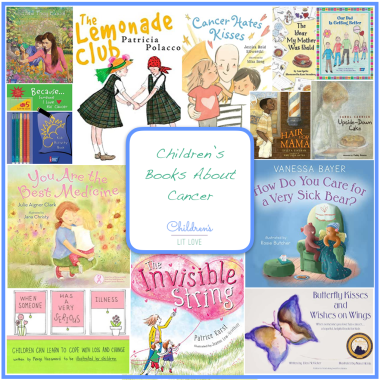
All links for purchase are Amazon Affiliate links, and most age ranges listed are publishers’ recommendations. Always remember that you know your child best! Thank you for considering making a purchase through my links!

How Do You Care for a Very Sick Bear? by Vanessa Bayer, illustrated by Rosie Butcher — A survivor of teenage leukemia, Bayer felt sharing ways that her friends were helpful during her cancer journey, as at that time as well as in her adult life, she has observed that friends (both children and adults) don’t often know how to help others going through cancer. How Do You Care for a Very Sick Bear is great for a child with a friend in cancer treatments, or a child wondering how to help a parent through cancer treatments. Ages 2-6.
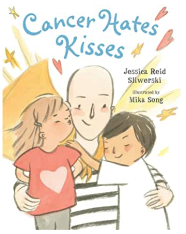
Cancer Hates Kisses by Jessica Reid Sliwerski, illustrated by Mika Song — This one is wonderful for your youngest children whose parents are facing a cancer diagnosis! Told from perspective of small children whose mom is battling cancer, Cancer Hates Kisses is based on the author’s experiences of being diagnosed with breast cancer shortly after her daughter was born. Be sure to check out “A Note from a Cancer Specialist” with tips for how parents should talk to young children about a parent’s diagnosis, as well as the author’s note. Ages 3-5, but a great resource for parents of slightly older children, and may be a perfect way to lighten the mood around a house during cancer treatments.
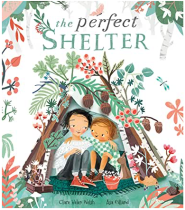
The Perfect Shelter by Clare Helen Welsh, illustrated by Asa Gilland —The Perfect Shelter is a story about cancer. But, more than that, it’s a story about family relationships, about love, about walking next to someone who is ill (though cancer is never explicitly named in The Perfect Shelter, a discerning eye sees it for what it is), about showing up when you are scared. In Welsh’s story, two unnamed sisters love to build forts with each other. But one day, things aren’t quite the same; the older sister is tired, and a storm starts to blow in. We watch the family toil and the sisters rebuild, but the storm (both of the cancer and the actual storm outside) continues to pound them with one obstacle after another. Sickness and rain, operations and lightning, hospitalizations and snow. But, the sisters manage to find their smiles again, even in the hospital, and even in the hospital, they realize that there is no time better than the present “to build a shelter and be together.” Ages 4 and up.
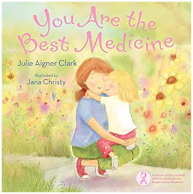
You Are the Best Medicine by Julie Aigner Clark, illustrated by Jana Christy — A good companion to Cancer Hates Kisses, Clark wrote this after her own cancer journey, connecting the ways that her own child cared for and nurtured her through her treatments with how mothers care for and nurture their children through those early years of life. Ages 4-8.
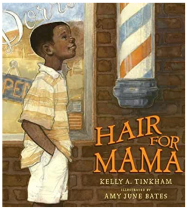
Hair for Mama by Kelly A. Tinkham, illustrated by Amy June Bates — Told from the perspective of an 8-year-old boy whose mom has cancer, Tinkham based this book on her own experience of a conversation she had with her son, who wanted to give her his own hair when hers started to fall out during chemotherapy. Speltz also takes time to explain cancer in a very child-friendly way, relating it to weeds that grow too big and crowd out flowers in a garden. Finding good cancer books for children is tricky; cancer books for children with diverse main characters are even harder to find! Ages 4-8.
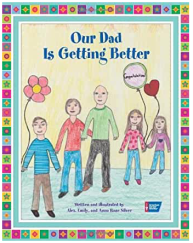
Our Dad is Getting Better by Alex, Emily, and Anna Rose Silver — Published as a companion to the original text Our Mom is Getting Better, these were written and illustrated by a husband and his two daughters about their family’s experience recovering from cancer treatments. Unlike any other book on this list, Our Dad is Getting Better starts when the chemotherapy is done, addressing the continuous and long recovery cancer patients might still face, rather than just the diagnosis and the chemo stages. It’s also trickier to find books featuring a father with cancer, as many center around the mother’s cancer journey. Ages 4-8.
The Hope Tree: Kids Talk About Breast Cancer by Laura Numeroff and Wendy S. Harpham, illustrated by David McPhail — Numeroff and Harpham drew from real experiences of children whose mothers have breast cancer to create a fictional support group for animals whose mothers have cancer. The Hope Tree addresses common cancer experiences (such as the day of the diagnosis), worries (like, “Is it contagious?”), and coping mechanisms (encouraging art therapy and drawing pictures), among other things. Ages 5-8.
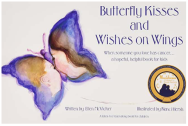
Butterfly Kisses and Wishes on Wings by Ellen McVicker, illustrated by Nanci Hersh — Originally written by an aunt as a gift for her cousin, who struggled to explain her cancer diagnosis to her children (ages 3 and 5), McVicker decided to publish this as a resource for other families to start conversations with their children about cancer diagnoses in their families. This gives a thorough, but child-friendly, explanation of what cancer is, and also addresses common questions children might have, such as is this their fault or is it contagious, as well as the normalcy of having LOTS of feelings about cancer. Ages 5-10.
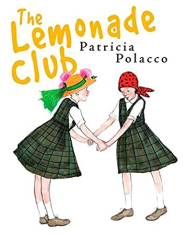
The Lemonade Club by Patricia Polacco — Polacco writes such insightful and touching books, because she bases them off of her own life experiences. The Lemonade Club is based on a true story of a girl who helped both a friend and a beloved teacher through their cancer battles at the same time. Given the length, this is better for older elementary students walking next to someone on a cancer journey. Ages 6-9, and maybe slightly older.
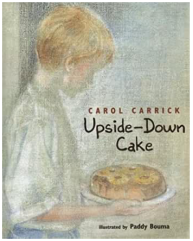
Upside-Down Cake by Carol Carrick, illustrated by Randy Bouma — This short chapter book about a dad with terminal cancer told from the perspective of a 9-year-old boy might serve as a mirror for those grieving or a terrific insight into grief for friends who are trying to understand. Ages 8-12.
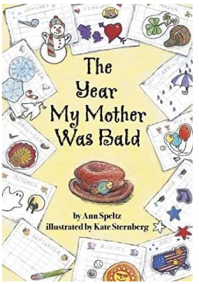
The Year My Mother Was Bald by Ann Speltz, illustrated by Kate Sternberg — Written in scrapbook form and based on experiences of Speltz and her daughter as Speltz walked through her cancer battle, this book also includes informational pages and text boxes that might be helpful to older children trying to understand more scientifically cancer and cancer treatments. Speltz also includes a long list of print resources, organizations, and websites that might help families during their cancer journey. Ages 8-13.
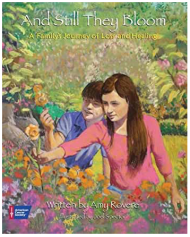
And Still They Bloom: A Family’s Journey of Loss and Healing by Amy Rovere, illustrated by Joel Spector — When Rovere was 9 years old, she lost her own mother to cancer; now, she works for the American Cancer Society. Though this is a picture book, it is a longer one, featuring two children who are grieving the loss of their mother to cancer. Both children handle their grief very differently, and their father has great ways to support them along their own paths. And They Still Bloom might help children who have lost a loved one feel less alone, and help peers better understand and support friends who are grieving the loss of a loved one. Ages 9 and up.
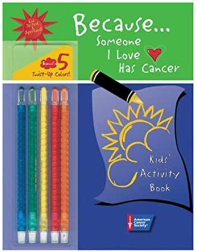
Because… Someone I Love Has Cancer (Kids Activity Book) published by the American Cancer Society — Written for kids with a loved one who has cancer, this journal uses artwork as a way for children to express emotions and heal. It is designed to help children deal with the cancer diagnosis, but it also includes family and group activities. Ages 6-12.
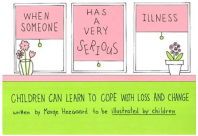
When Someone Has a Very Serious Illness: Children Can Learn to Cope with Loss and Change by Marge Heegaard — Perfect for children who have loved ones with any sort of illness, not just cancer, this workbook/journal is for children to help them process the changes that are happening in their lives and the emotions they feel when a loved one is sick. Heegaard divided this into different thematic sections, each with additional suggested reading. Ages 9-12.
Cancer Party!: Explain Cancer, Chemo, and Radiation to Kids in a Totally Non-Scary Way by Sara Olsher — One of the best resources I could find to explain cancer in a child-friendly way, Cancer Party walks children through cancer, radiation, and chemotherapy in (as the title says) a nonthreatening yet informative manner. Olsher wrote this after many conversations sharing her own cancer diagnosis with her six-year-old daughter. Ages 4-10.
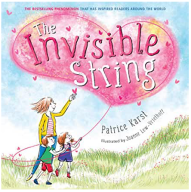
The Invisible String by Patrice Karst, originally illustrated by Geoff Stevenson and rereleased with illustrations by Joanne Lew-Vriethoff — This one isn’t a book about cancer, but it’s an incredibly important book for children to read with their loved ones at a time when life is changing, the future seems uncertain and scary, and someone they love is very, very sick. No matter the situation, The Invisible String has a powerful message for young children– they are always connected to their loved ones. Karst tenderly connects these Invisible Strings to loved ones who have died, and addresses the idea that “Love is stronger than anger, and as long as love is in your heart, the String will always be there.”
You can also find this list featured on HuffPost Parenting! If this list was helpful to you, you might also like my list of Books for Helping Children Cope with Fears and Worries.

I have forwarded this list to the director of Kindermourn here in Charlotte, and to my school Director. We have a child whose mommy is fighting leukemia. I’m a breast cancer survivor. And I’ve been very blessed to be healthy! I will be sharing this with my “connections” at the Levine Cancer Institute here.
I am a new follower to your wonderful blog. At our Preschool, I am the storyteller/librarian. Many of your book suggestions will be added to our little library!! Thank you!
Miss Terry in the Library
LikeLike
Miss Terry,
Thanks for following along, and for forwarding my information out. It sounds like your school community is facing a heavy journey right now– hopefully some of these books will help.
I’m so glad to hear of your health. May you continue in health going forward!
Mary
LikeLike
Children’s books have such a heavy responsibility of teaching children about life issues in the simplest way possible. This is a great list you put together!
LikeLike
Yes, they really do. They give children such a wonderfully safe place to process and to practice difficult experiences. This was not a fun list to put together, but worth it if it helps children and families through an incredibly difficult period. Thanks for following along!
LikeLiked by 1 person
Please consider my book: M.C. Plays Hide & Seek. It focusses on feelings children experience and empowering them with ways to make a difference.
LikeLike